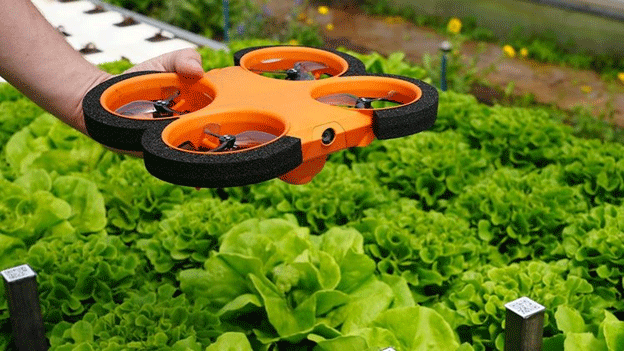High-Tech Drones Revolutionizing Crop Monitoring
The Bavarian State Institute for Viticulture and Horticulture (LWG) is exploring cutting-edge solutions to support greenhouse farmers in managing crops efficiently. One groundbreaking initiative involves using autonomous drones for monitoring salad crops grown hydroponically—a method that maximizes yield while conserving resources.
Hydroponic salad cultivation in Bavaria is growing steadily, with 12 hectares under glass in regions like Knoblauchsland producing yields equivalent to over 400 hectares of open-field farming. The dense planting system, requiring precise monitoring to prevent pest infestations or nutrient imbalances, makes manual observation labor-intensive and costly.
In Bamberg, LWG is piloting drones equipped with artificial intelligence (AI) to autonomously inspect crops. These drones fly over the greenhouse daily, capturing detailed images analyzed by AI for signs of anomalies, such as discoloration, pest activity, or nutrient deficiencies. The system alerts growers to take timely action, minimizing crop loss and optimizing resource use. Early trials have demonstrated the technology’s ability to reduce manual labor significantly while improving crop health monitoring.
Agri-Photovoltaics: Energy and Crop Protection Combined
Climate change poses a severe threat to agricultural productivity, with extreme weather reducing yields. The need for renewable energy and climate-resilient farming has brought agri-photovoltaics to the forefront. This innovative approach combines solar energy production with farming, offering dual benefits of power generation and crop protection.
Bavaria is testing agri-photovoltaic systems designed to shield crops from hail, excessive sun, and heat. Installed at just 3.5 meters above ground, these solar modules adjust to maximize light capture for energy production while allowing sufficient sunlight for crop growth. Additionally, the systems can respond to weather changes by repositioning panels to let rainwater through or provide shade during heat waves.
The project aims to identify which crops are most compatible with this dual-use system and how much light can be diverted for energy without significantly impacting yields. Initial studies suggest that this technology not only supports biodiversity by creating microhabitats beneath panels but also enhances productivity by optimizing land use.
Collaboration and Future Goals
These initiatives are the result of collaborations among agricultural experts, technology companies, and institutions like Bavaria’s Technology and Promotion Center (TFZ). The data collected will guide farmers in selecting optimal systems for their needs, balancing energy and agricultural outputs.
As a unique addition, the unused areas beneath the solar panels are being studied for their impact on local biodiversity, such as weed and insect populations. Understanding this interaction will help maximize land utility while promoting ecological health.
The integration of technologies like drones and agri-photovoltaic systems marks a significant step toward sustainable agriculture in Bavaria. By increasing efficiency, reducing resource dependence, and enhancing resilience to climate change, these innovations provide a blueprint for the future of farming globally. Collaborative efforts in research and development will ensure these solutions benefit not just farmers but also the environment and society at large.









